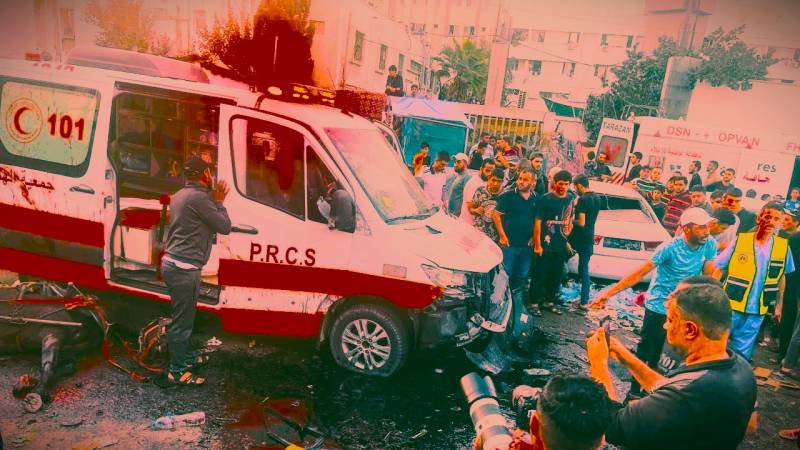
Gaza's second largest hospital, the Al Quds Hospital, which operates in conjunction with the Palestinian Red Crescent Society (PRCS), has run out of fuel. With all communications cut off, some 14,000 people, some 500 patients and medical staff are at risk.
This was stated by Nebal Farsakh, a spokesperson of the Palestinian Red Crescent Society (PRCS), whilst speaking with Rabia Mehmood at New Wave Global.
She said they had lost all communication with the Al Quds Hospital four days ago, with phone and internet connections all cut. Moreover, all roads leading to and from the hospital were blocked six days ago because of destroyed buildings to its north and south, making ground access nearly impossible.
With electricity almost cut off, she said that these people have to spend the night looking at the flash of bombs and the sound and the shock waves they produce in the darkness of the night.
"We barely have some fuel that could last for a few hours more," Farsakh said, adding that they have already limited their services to the minimum.
"We have turned off our main generator, and now we are only using the small generator we have," she said, adding that it has forced them to shut down the surgical ward and the oxygen generator to rely on oxygen cylinders.
"Although we have taken all of these measures, we are only hours, a couple of hours away, and the hospital will be completely shut down because of running out completely of fuel," she added.
The situation inside the Al Quds hospital is dire. Medical teams are providing medical care at night using the flashlights of their mobile phones because the electricity has been cut.
"No doctor, no nurse, no hospital can operate under such conditions."
She further said they have a very limited amount of food and water remaining. Our teams cannot afford to give food and water to the patients or the medical staff, as well as 14,000 civilians up to this moment. Unfortunately, none of the humanitarian agencies could deliver aid to Al Quds Hospital.
Under attack
"We witnessed yesterday (Friday) a direct attack from Israeli occupation forces on Al Quds Hospital. They opened fire on the intensive care unit of the hospital. This has resulted in the killing of one person as well as 28 others were injured," she said, adding that around 14,000 civilians and around 500 patients are inside and on the grounds of the hospital.
The continuous bombardment, Farsakh said, is causing fear and panic among the people taking shelter, the patients and the staff that they could lose their lives as a result of the continuous bombardment.
The PRCS official added that due to Israeli attacks, 10 of their 18 ambulances in Gaza have been rendered inoperable. Three of the remaining ambulances were in north Gaza and four in Gaza City.
However, she said that it no longer mattered how many ambulances they had since they could not get to the dead and injured because of Israeli soldiers and Israeli shelling.
"There are snipers everywhere, so any ambulance or a paramedic who tries to reach specific places, they are in the threat of losing their life because Israeli forces are targeting ambulances and emergency medical teams," she explained.
Horrific scenes
"The scene in Gaza is just horrific," Farsakh said, adding, you can see many people who are killed on the ground. No one, not even ambulances, can reach them.
We call on the international community and humanitarian agencies to stand up to intervene immediately and deliver aid to Al Quds Hospital and save the patients and 14,000 civilians who are taking shelter inside the hospital, she pleaded.
Situation in West Bank
Farsakh said that the PRCS is the leading emergency medical services provider in the occupied Palestinian territories; this includes the West Bank and the Gaza Strip.
Since the beginning of the escalation (after October 7), Farsakh said their teams have been working around the clock to deal with increasing casualties.
"The West Bank has witnessed various confrontations that are taking place in various Palestinian cities. This has resulted in the killing of dozens of people as well as over 2,500 injuries," she said, adding that there has been an increase in the violence from the Israeli occupation forces or the settlers themselves in various Palestinian cities in the West Bank.
"We are also talking about the increased raids by Israeli occupation forces to various cities and camps across the West Bank."
The situation, she claimed, was quite dangerous even for their teams who Israeli occupation forces had targeted.
"We have reported an alarming number of violations against our medical teams. At least 15 or even more of different violations against our medical teams, from denying access to wounded people, which has resulted in those wounded people losing their lives because they do not have access to emergency medical services," she stated.
She further claimed that PRCS medical teams responding to emergencies were detained by Israeli forces and were threatened. "They were targetting our ambulances with live ammunition; many paramedics have been injured," she added.
Recalling one incident, Farsakh said that a female paramedic was targeted while she was trying to save the life of a wounded person.
"The situation in the occupied Palestinian territory, whether in Gaza Strip or the West Bank, is so much dangerous and basically hospitals, paramedics, healthcare workers are not protected."
She asserted that paramedics, healthcare workers, hospitals and ambulances should be protected under International Humanitarian Law. But lamented that this is not the case in the Occupied Palestinian Territory because Israel targets "everything and everyone".
My message to the international community is to intervene immediately to protect civilians, healthcare workers and healthcare facilities under international humanitarian law.

